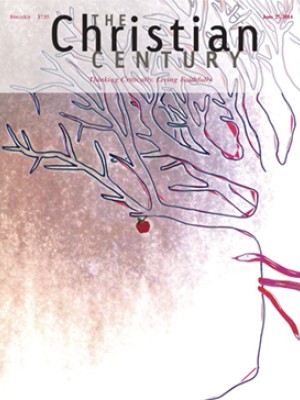Why I kiss my stole: A pastor's habit of reverence
Ritual actions can linger, even as belief fades in and out.
As I vested for worship on a recent Sunday, a parishioner noticed me kissing my stole before I put it on. “I like that you do that,” she said, to my brief and unexpected embarrassment. I’ve made this small gesture every time I’ve vested since my ordination, but no one had ever prompted me to reflect on it before.
Augustine says that habit unresisted becomes compulsion. This maxim rings true with my experience of bad habits, but I’d never thought of it in terms of pious ones. My parishioner’s comment made me realize that kissing my stole has long since sunk from a distinct act into a habit—and may now be a compulsion.
Read our latest issue or browse back issues.
“I guess it reminds me,” I told her.
I was apprenticed in ministry for a long time, even by Lutheran standards. I watched a lot of clergy vest. When I was young, the chance sight of a dear family friend—a Methodist elder and northern Wisconsin politician—preparing to preside at my cousin’s wedding prompted an early hint at a vocation. Stiff with diabetes, he braced himself against the hallway wall while his wife helped him into his alb. Together they composed a picture of stubborn dedication.
I picked up the practice of kissing the stole from a pastor in Chicago. He had graciously accepted a last-minute plea to celebrate Holy Communion on Maundy Thursday after my internship supervisor wound up in the hospital. While we stood talking in the sacristy, he paused to make that silent movement. I was prepared to preach on short notice; generating words was never hard for me. But in that moment I saw the significance of something very different: being formed, over time, in reverence for handling the holy things my tradition still closely associates with ordination.
The importance of habit for religion, morality, and social harmony is taken for granted in most of the ancient religious and philosophical thought I’ve encountered. Jesus complicated things. He carried on the prophetic tradition of criticizing received habit and ritual formalism, criticizing, for instance, the custom of washing hands and vessels before eating. Pure intentions and just relationships can be obscured by adherence to such customs. But the power of meaning embedded in endlessly, reliably repeated actions is stronger than any one critique.
A non-Christian roommate of mine, bored enough and diligent enough to get through my copy of Bonhoeffer’s Ethics, once asked me why a jogger crossed himself as an ambulance screamed by. It’s a sort of physical prayer, I told him, bluffing. Then Bonhoeffer would approve of it, he said—it bypasses the fallenness of consciousness because it is habitual and automatic. A previous roommate had told me, with a tone of astonished complaint, that the nuns who taught her in school had ingrained that action in her so deeply that she still did it.
Now I do it. If I forget, my five-year-old reminds me. (It is a curious fact of church life that we still tend to segregate our youngest, most ritually alive members from Holy Communion until they are past the age when it is likeliest to fascinate them.)
Ritual actions, the scholars of religion tell us, are generally older and less liable to change than the words that accompany them, the stories that explain them, or the meanings we glean from them. Baptism is older than the trinitarian formula or the doctrine of original sin; Holy Communion was practiced before the institutional narrative became part of the celebration. There are words that are repeated in such a way that they become ritual actions of their own. A table grace repeated by rote, the Lord’s Prayer said at morning or night, the creed recited in church—all bridge the divide, often a stark one in classical theology, between inward and outward, spirit and flesh, intention and action.
The skein of habitual acts that frame and weave through my conscious faith (and that of other believers) has roots in magic and superstition and branches in poetry. Such acts can be, as Freud would have it, neurotic compulsions, or they can be deeply invested with tragic significance. And the distance between the depths and the height—the primal shudder and the song of praise—can be traversed, back and forth, in the space of a single prayer.
There is great resilience in equivocal habits such as these. Ritual actions that sustain multiple meanings can linger, even as the movement of will that we call “belief” fades in and out. If there is indeed a renewal of high-liturgical worship among American Christians, I would guess that this is why. A worship experience rich in stable symbolism and repeated gesture can speak to us when the bare demand for assent and enthusiasm expressed by minimal liturgy does not.
I started kissing my stole when I was still awed to be wearing it and to be inhabiting the office it represents. I do it now as a sign of reverence for a task that must be faithfully and lovingly done whether or not I feel awed by it at a given moment.
I can’t make any great claim for the efficacy of such gestures. If I could, this efficacy would quickly substitute itself for the real meanings of the habit. But these meanings have silently connected hundreds of forgotten liturgies, hundreds of fellow humans journeying to healing or death, thousands of unremarkable family meals and bedtimes into a whole that is much bigger than any given moment. They are tiny soundings dropped from the little bark of consciousness into the ocean of life below. The more crowded that bark becomes for us—with instant dispatches from India, viral videos from Tanzania, photographs of children we’ll never meet, lists and quizzes and news and arguments all begging for space—the more important those soundings become.






